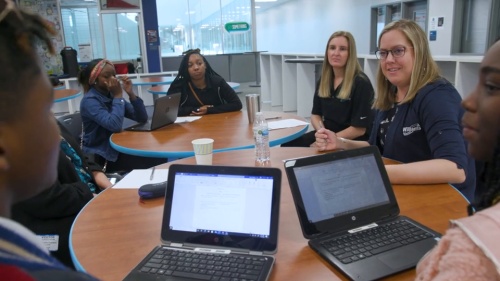The benefits of bees or the solution of sheep — students at Sterling High School had a choice to make.
Which would be more environmentally beneficial to solar sites planned by Williams to power some of our natural gas operations?
The recent case challenge was part of the 3DE curriculum at the Houston high school. Over several weeks, Williams volunteers coached teams of students as they researched this business scenario.
“It’s been really exhilarating,” said student Symora. “It’s been helpful to talk to the Williams employees about the pros and cons of sheep and bees. For example, I thought the sheep would chew on the solar equipment but they are not like goats in that way.”

Employee Jamie Johnson said the scenarios studied by students were more than a hypothetical exercise. It’s a decision Williams is in the process of making: graze sheep on the land with solar panels or host a bee colony that would produce honey, both benefiting local agricultural providers.
“I’m excited about getting the kids excited,” said Johnson, business development lead for solar. “Our industry is important and it’s important for kids to know what’s going on and how they can impact it in their own way. We are all invested in the energy future.”
What is 3DE?
Sterling High School is the fourth high school in Houston to adopt the 3DE learning model that is an initiative of Junior Achievement.

3DE was developed through a shared vision from leaders in education and business united around the belief that equitable access to high quality education is the lever to economic mobility. Public-private partnerships are re-engineering education to better reflect the real world and prepare students for life beyond the classroom walls.
Case challenges are incorporated into curriculum in multiple classes, including math, English and science.
“3DE is an opportunity to infuse education with relevance, to develop the competencies they are going to need for the future of work. Students get to access a network of companies and careers that they otherwise might not experience,” said Joseph Burke, president of Junior Achievement of Southeast Texas.
“Volunteers like those from Williams are critical because they share their life experience and their work experience with young people and it’s very motivating and inspiring,” he said.
Zhanay Buckner, the 3DE director at Sterling High School, said the program is transformative for the 9th graders who are part of the program in its inaugural year there.

“The students get to work with people in the community who want to know their opinion and what they think,” she said. “It improves their confidence and student outcomes, whether they go to college or straight into the workforce.”
At the end of their research, the student teams visited the Williams office tower in Houston and presented their studies to a panel of employees.
The experience was so impactful that one student told Buckner, “I didn’t want to go to school after high school, I was just going to find a job or something. After our field trip to the Williams tower, I want to do more, maybe college or try to work for Williams. I think I can do it.”
For Williams CEO Alan Armstrong, that’s music to his ears. He’s long been an advocate for Junior Achievement and now serves as board chairman of Junior Achievement USA and on the board of 3DE. Williams supports both national programs and contributes to JA organizations in eight states.
“It’s powerful in terms of changing kids’ lives and really opening their eyes and getting them excited about education,” Armstrong said. “And voila a light goes off that, gee, that’s why I need to learn this stuff, because there are real problems to be solved.”
